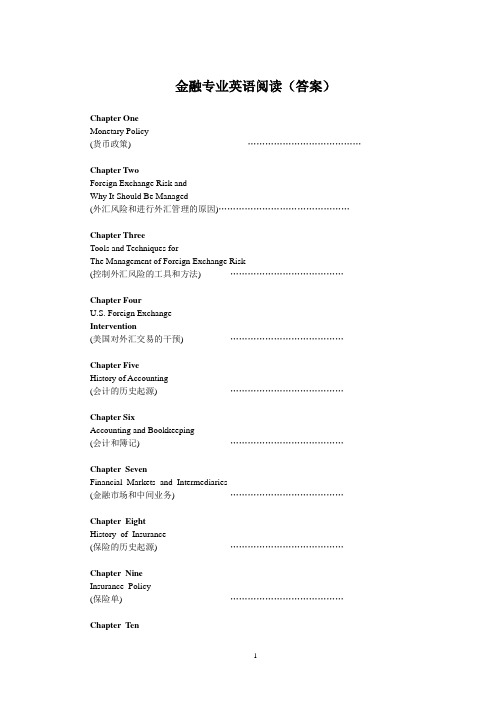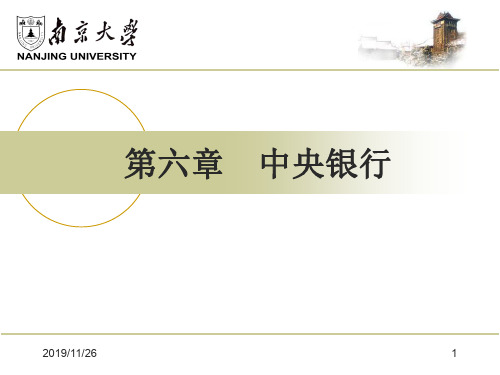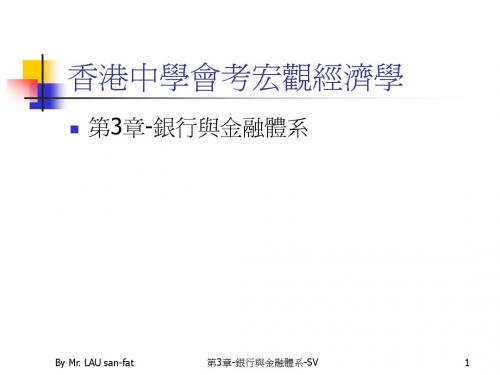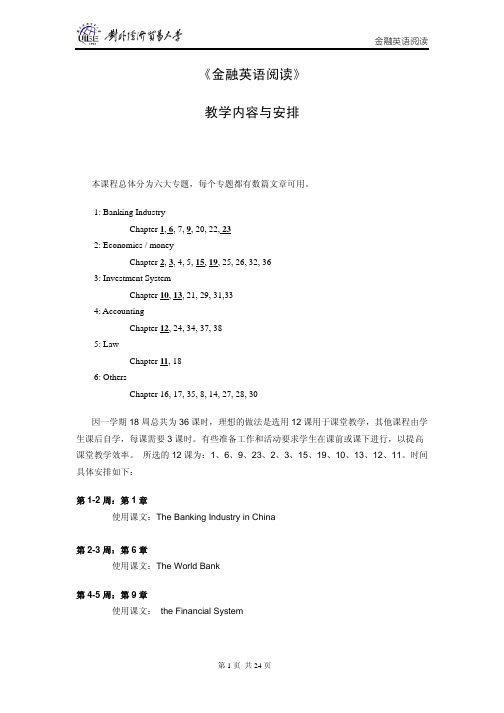UNLPP-金融英语阅读:银行的基本功能与业务复习进程
- 格式:doc
- 大小:15.50 KB
- 文档页数:3

金融专业英语阅读(答案)Chapter OneMonetary Policy(货币政策) …………………………………Chapter TwoForeign Exchange Risk andWhy It Should Be Managed(外汇风险和进行外汇管理的原因)………………………………………Chapter ThreeTools and Techniques forThe Management of Foreign Exchange Risk(控制外汇风险的工具和方法) …………………………………Chapter FourU.S. Foreign ExchangeIntervention(美国对外汇交易的干预) …………………………………Chapter FiveHistory of Accounting(会计的历史起源) …………………………………Chapter SixAccounting and Bookkeeping(会计和簿记) …………………………………Chapter SevenFinancial Markets and Intermediaries(金融市场和中间业务) …………………………………Chapter EightHistory of Insurance(保险的历史起源) …………………………………Chapter NineInsurance Policy(保险单) …………………………………Chapter TenBank for International Settlements(国际清算银行) …………………………………Chapter ElevenCommercial Bank Lending(商业银行借贷) …………………………………Chapter TwelveCredit Analysis(信贷分析) …………………………………Chapter ThirteenWhat Kind of Mortgage Loan Should You Get?(何种抵押贷款更适合你?) …………………………………Chapter FourteenMutual Fund(共同基金) …………………………………Chapter FifteenBonds(债券) …………………………………Chapter SixteenOptions(期权) …………………………………Chapter OneMonetary Policy货币政策Answers:Multiple choices1.D2.B3.C4.C5.ATrue or False1.F2.T3.F4.T5.F6.TRead the following text and choose the best sentences for A to E below to fill in each of the gaps in text1. E2. B3. D4. A5. CCloseEmployment, demand, fiscal policy tools, monetary policy, central bank, interest rates, "stable" prices, inflation, "federal funds" rate, open market operationsTranslation:Translate the following passage into Chinese1.紧缩性货币政策和扩张性货币政策都涉及到改变一个国家的货币供应量水平。



名词解释:Credit refers to a behavior of borrowing and lending with the feature of repayment of the principals plus interests . Financial markets refer to the whole of the places and activities of the financing and transactions of financial instruments. Sale on commission(推销): It refers to the case in which investment bankers sell securities on behalf of issuers and earn from what they have sold, but have no obligation to take up what’s left as medium of Money demand refers to the quantity of money that the whole economy needs exchange, means of payment and store of value under certain economic condition. Inflation is a continuous and obvious rise of the price level caused by great increase of money supply and it reduces the purchasing power of each unit of a currency. 二1 General equivalent 一般等价物2 Public credit 国家信用3 Default risk 违约风险4 Repurchase agreement(RP)回购协议5 Interest-rate future 利率期货6 Re-discount 再贴现7 Compound interest 复利8 Liquidity preference 流动偏好即货币需求9 Speculative motive 投机动机10 Adverse selection 逆向选择11 Require reserves 存款准备金12 Overdraft 透支13 Time lag 时滞14 velocity of money 货币流通速度15 money stock 货币存量16 derivative deposit 派生存款17 excess reserve 超额储备18 Money multiplier 货币乘数19 Endogenous 内生性判断题T F 1. When a central bank carries out expansionary monetary policy, bank reserves R will increase. T F 2. The monetary base consists of banking system reserves and the currency held by the non-bank public T F 3. The moral hazard arises before a financial transaction begins. T F 4. As is subject to time limit, the commercial credit can only be short-term one. T F 5. Sale on commission refers to the case in which investment bankers sell securities on behalf of issuers and earn from what they have sold, but have no obligation to take up what’s what’s left. left. T F 6. 6. If If If a a a central central central bank bank bank wants wants wants to to to cool cool cool an an an inflationary inflationary inflationary boom, boom, boom, it it it will will will raise raise raise the the the discount discount discount rate, rate, which which will will will lead lead lead to to to a a a general general general interest interest interest rates rates rates rise rise rise for for for loans, loans, loans, decreasing decreasing decreasing the the the demand demand demand for for borrowing. T F 7. 7. A A A central central central bank bank bank is is is the the the financial financial financial institution institution institution that that that can can can gain gain gain profit profit profit in in in its its its operation operation operation and and businesses, but it is not a profit-seeker. T F 8. When a central bank carries out tight monetary policy, interest rates fall. T F 9. The theory of “Quantity theory of money” means that an increase in prices of all goods and and services services services leads leads leads to to to an an an increase increase increase in in in the the the supply supply supply of of of money money money when when when everything everything everything remains remains unchanged. T F 1010. Banker’s credit is an indirect credit . Banker’s credit is an indirect credit英译汉英译汉1. On the one hand, although the central bank does not make loans to enterprises and can not derive derive deposits deposits deposits directly, directly, it it controls controls controls the the the sources sources sources of of of commercial commercial commercial banks` banks` banks` money money money creation creation —the creation creation and and and supply supply supply of of of the the the monetary monetary monetary base; base; base; and and and on on on the the the other other other hand hand hand commercial commercial commercial banks` banks` banks` money money creation creation through through through taking taking taking in in in deposits deposits deposits and and and granting granting granting loans loans loans is is is based based based on on on the the the central central central bank's bank's bank's monetary monetary base. 一方面,尽管中央银行并不直接为企业发放贷款,尽管中央银行并不直接为企业发放贷款,也不能产生派生存款,也不能产生派生存款,也不能产生派生存款,但是中央银行却控但是中央银行却控制着商业银行创造货币的源泉——基础货币的供给和创造。

《金融英语阅读》教学内容与安排本课程总体分为六大专题,每个专题都有数篇文章可用。
1: Banking IndustryChapter 1, 6, 7, 9, 20, 22, 232: Economics / moneyChapter 2, 3, 4, 5, 15, 19, 25, 26, 32, 36SystemInvestment3:Chapter 10, 13, 21, 29, 31,334:AccountingChapter 12, 24, 34, 37, 38Law5:Chapter 11, 18Others6:Chapter 16, 17, 35, 8, 14, 27, 28, 30因一学期18周总共为36课时,理想的做法是选用12课用于课堂教学,其他课程由学生课后自学,每课需要3课时。
有些准备工作和活动要求学生在课前或课下进行,以提高课堂教学效率。
所选的12课为:1、6、9、23、2、3、15、19、10、13、12、11。
时间具体安排如下:第1-2周:第1章使用课文:The Banking Industry in China第2-3周:第6章使用课文:The World Bank第4-5周:第9章使用课文:the Financial System第5-6周:第23 章使用课文:International Monetary Fund第7-8周:第2章使用课文:Politics vs. Economics第8-9周:第3章使用课文:Money第10-11周:第15章使用课文:The Macroeconomics of International Currencies第11-12周:第19章使用课文:Bretton Woods and the Gold Exchange Standard第13-14周:第10章使用课文:Assessing Investment System第14-15周:第13章使用课文:Investment Products and Services Provided by Insurers第16-17周:第12章使用课文:Pooling of Interests Accounting第17-18周:第11章使用课文:Invitation for Bids教学大纲Topic One: Banking Industry第一章The Banking Industry in China1、教学目的By the end of the chapter, students should be able to know about¾the development of the banking industry in China¾the structure of the central banking system¾the major tasks of the three policy banks in China.2、教学计划This chapter will cover 3 hours. 2 hours for the introduction of background information and explanations of terms and the texts. And the other 1 hour for discussion and practice.3、教学方法¾Translation: key sentences and terms¾Paraphrasing: major words and sentences¾Summarizing: important paragraphs¾Discussion: key issues¾Questions and answers4、背景知识The establishment of the People’s Bank of China in 1948 marked the beginning of a new chapter in the Chinese banking history. Through five decades of evolution, particularly nearly two decades of reform and opening to the outside world, China’s banking sector has entered a stage of vigorous development. With PBC as the central bank, the current banking system in China consists mainly of wholly state-owned commercial banks, which coexist and cooperate with policy banks and joint-equity commercial banks operation in their respective authorized business domains.5、重点讲解概念讲解PBCAll in one monopolistic banking systemSpecialized bankCentral bankForeign exchange reservesFiscal agentAggregate creditMonetary baseBenchmark interest rateFiscal deficitLending facilitiesPriority constructionFixed-asset investmentCommodity reservesSubsidiary第六章The World Bank1.教学目的By the end of the chapter, students should be able to know about:¾the composition of the World Bank Group;¾the importance of the World Bank Group;¾the functions of the World Bank;¾the future development of the World Bank.2.教学计划It is scheduled to take 3 hours to handle this chapter. 2 hours will be spent on explanation of the key words, phrases sentences and the features of the text, and 1 hour for class discussion and questions and answers.3.教学方法¾Translation: key sentences.¾Paraphrasing: key words and expressions.¾Explanation: new terms.¾Summarizing: key passages.¾Discussion: important issues.¾Questions and answers: interaction between teachers and students.4.背景知识The International Bank for Reconstruction and Development, usually referred to as the World Bank, was founded by the Bretton Woods Conference as an international bank to finance thereconstruction and development of member countries. Operations started in 1946. The bank is financed partly by contributions paid by member countries, partly by bond issues.5.重点讲解概念讲解hard loansubscribed capitalcompetitive biddingcredit linegrace perioddisbursed loan balances句子讲解1.Visions of imperialism, real or imagined, are less likely if the lender/donor is multinational or international.译文:无论从实际或假想的角度,一国专制的情形都不大可能出现。

In China one of the most important services that a modern bank provides is the savings business. With a regular passbook savings account you have opened in a bank, you will be able to draw money whenever you need it. All banks pay interest on savings accounts. If you keep your money in the bank for a certain period of time, you can get a higher interest rate by buying a savings certificate. The longer the period, the higher the interest rate. 在中国,现代银⾏所提供的最重要的业务之⼀就是储蓄存款。
有了银⾏开⽴的普通储蓄账户存折,你就可以随时取款。
所有银⾏都对储蓄存款⽀付利息。
如果你购买了⼀张储蓄存单,把钱存放在银⾏⼀段时间,你就会得到较⾼的利率。
期限越长,利率越⾼。
Another service that banks in the big cities provide is safe-deposit boxes, where you can keep important papers and valuables. As a rule, you should fill out a signature card and pay some fee. Then you will get a key to your box, and the bank will keep another key. With your genuine signature and these two keys, you can open your box. 在⼤城市的银⾏⾥,有另⼀种服务就是保管箱业务,在那⾥你可以存放有价证券和贵重物品。
《金融英语阅读教程第三版》课后答案
《金融英语阅读教程第三版》课后答案
第一部分参考译文
Topic One:Introduction
引言
1.政治与经济
2.金融部门的经济角色
3.金融危机
Topic Two:Financial System
金融体系
4.金融体系
5.国际货币体系和国际收支
6.世界银行
7.国际货币基金组织
8.中国的银行业
9.银团贷款的历史与发展
Topic Three:Money and Economies
货币与经济
10.货币
11.国际货币的`宏观经济学
12.布雷顿森林协议与金汇兑本位制
13.洗钱
14.世界经济全球化
Topic Four:Investment System
投资体系
15.投资系统评估
16.期货与期权
17.为什么进行全球投资
Topic Five:Accounting
会计
18.金融工具会计
19.应收款项估值会计
20.公司融资策略概观TopicSix:Insurance
保险
21.面向家庭的保单
22.保险商提供的投资产品与服务Topic Seven:Law
法律
23.招标广告
24.合同法
25.宾夕法尼亚公平银行
26.为什么税务法规影响投资决策Topic Eight:Optional Reading 补充阅读
27.微观经济学
28.国际收支平衡
29.为什么财务管理如此重要
30.统计学的基本概念
31.管理会计的整体性。
U N L P P-金融英语阅读:银行的基本功能
与业务
Banks were developed to keep people's money safe and to make it available when they needed it. Since money was invented, people have been borrowing and lending it.
开办银行是为了稳妥地保管人们的钱财,使他们在需要时能随时提取。
自从货币出现以来,人们一直在进行货币的借贷活动。
A modern bank accepts people's money for safe-keeping. It also lends money and offers many other services. The experience of a businessman will show some of these. James Jones has a furniture store and buys his goods from different parts of the country. It isn't convenient for him to send money through the mail, so he goes to the bank and opens a checking account. He puts his money in the bank regularly, and the bank keeps it until he writes checks for that amount. When Mr. Jones orders furniture from the Modern Furniture Company in another city, he simply writes a check. This check is as good as money to the owner of the company. The owner can take it to his bank and cash it, that is, he can get money for it.
现代银行从客户手中吸收货币并加以妥善保管,也贷放货币,并提供许多其它服务。
我们从一个商人的经历可以看到银行是如何办理某些业务的。
詹姆斯·琼斯开了一个家具店,需要从全国各地购买家具。
通过邮局汇款使他感到不方便,因此,他到银行开了一个支票账户。
通常他把钱存放在银行,银行保管着这笔钱,直到他开支票提完这笔钱为止。
当詹姆斯·琼斯从另外一个城市的摩登家具公司定购家具时,他只要开出一张支票。
这张支票对公司的老板来说就跟真正的货币一样,该老板可以拿着支票到银行去兑现,也就是说,他可以凭支票取钱。
Now and then Mr. Jones deposits money in a savings account at the bank. The bank then uses this money and pays him a certain percentage on each dollar every year. For example, if he deposits $ 1000 and the bank pays him 4 percent, he will have earned $ 40 by the end of the year. This payment is called interest.
琼斯先生时常把钱存放在银行的储蓄账户上,银行就使用这笔钱,每年按每一美元的一定百分率付给他利息。
比如说,如果他存1000美元,银行付给他4%的利息,他会在年底得到40美元。
这笔钱就是利息。
Mr. Jones can usually borrow from the bank if he needs money. He can arrange for a bank loan at the loan department. If the bank lends him money, he must pay interest for its use. Sometimes, instead of putting his money in a savings account, Mr. Jones wants to invest it in some business firm, and he may ask the investment department of his bank for advice.
琼斯先生如果需要钱用,通常可以向银行借。
他可以在银行贷款部筹到一笔银行贷款。
如果银行贷款给他,他就必须为使用这笔贷款而支付利息。
有时,琼斯先生不把钱存放在储蓄账户上,而是想把钱投到实业中去,他可以向银行的投资部门咨询。
Mr. Jones gets still other services from the bank. When he travels, he buys traveler's checks from the bank instead of carrying money with him. And he can rent a safe-deposit box in the bank for his valuable papers and articles.
琼斯先生还可以得到银行的其他服务。
当他外出旅行时,不是把钱带在身上,而是从银行购买旅行支票。
他还可以租借银行的保管箱,存放有价证券和贵重物品。
It's hard to imagine that people could do business without the services of a bank.
很难想象出人们在没有银行服务的情况下做生意的情形。